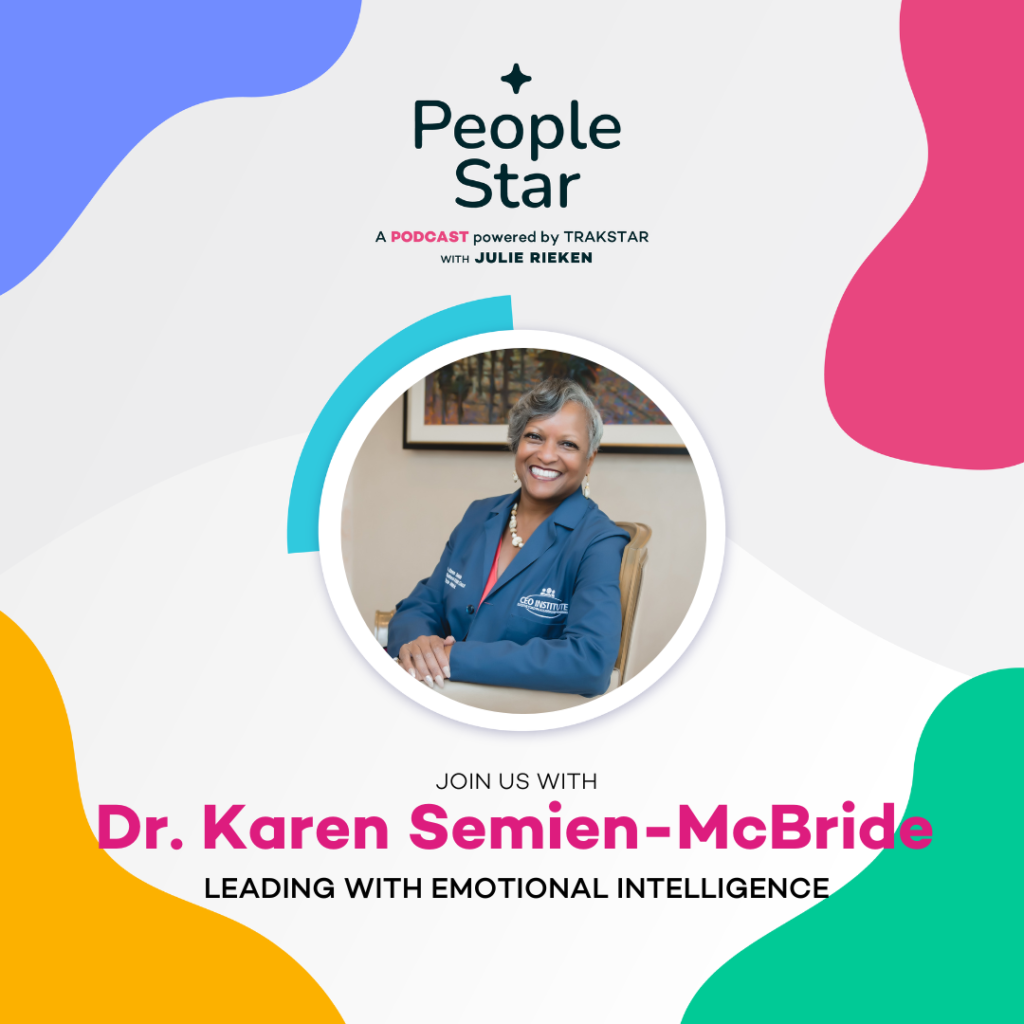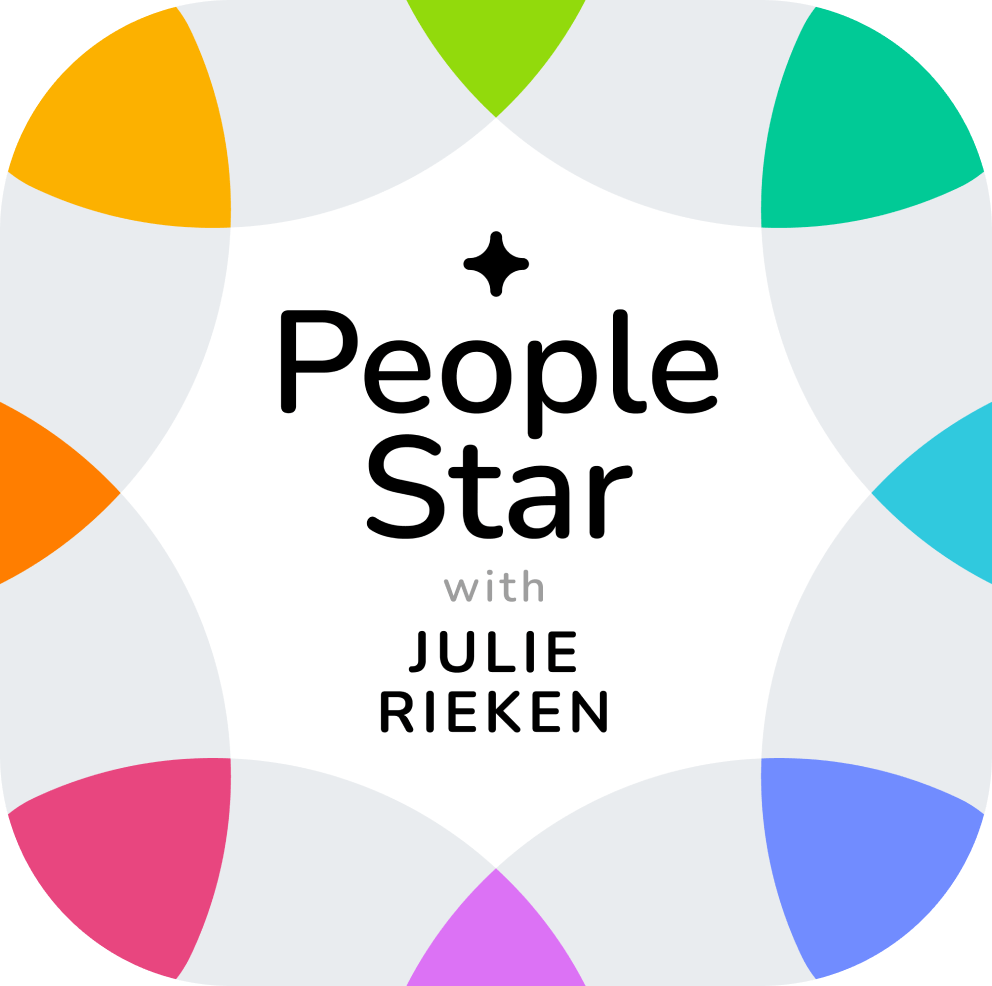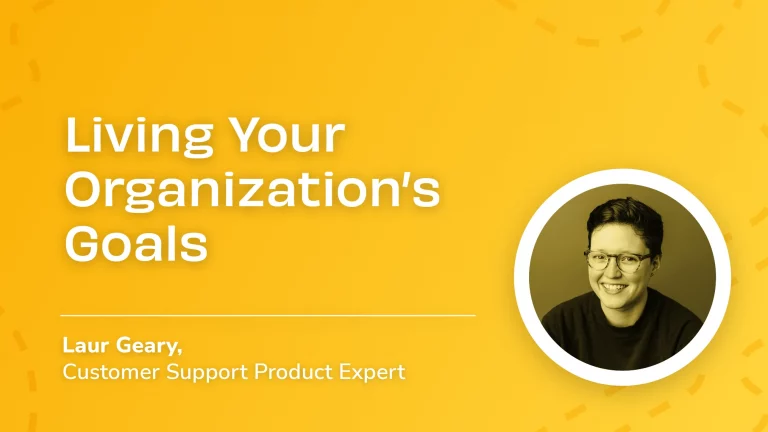PeopleStar_Dr Karen Semien-McBride: this mp3 audio file was automatically transcribed by Sonix with the best speech-to-text algorithms. This transcript may contain errors.
PeopleStar Intro:
Welcome to the PeopleStar Podcast. We deliver leadership perspectives from industry experts on their people, architecture, routines, and culture as they solve HR's newest challenges. And now your host, Julie Rieken.
Julie Rieken:
Hello podcast listeners. Julie Rieken, host of the People Star Podcast, and today I'm thrilled. We've got Dr. Karen Semien-McBride. She is the CEO of MKCircle CEO Institute. She has a phenomenal personal journey that's led her from her background to now being the CEO of this organization, where they develop and coach leaders, and HR folks, and everyone who's listening, building more leadership skills and coaching leaders and developing that, flexing that muscle, is something we can all benefit from. So, Dr. Karen, welcome! I'm thrilled to have you here with me today.
Karen Semien-McBride:
Oh, Julie, thank you for having me. I'm just as thrilled.
Julie Rieken:
So, do you mind, can I call you Dr. Karen.
Karen Semien-McBride:
Please do! Affectionately, they all call me Dr. Karen. I guess I'm taking on the persona of a Dr. Phil. I like it.
Julie Rieken:
Well, I think it's important that. Well, we may as well, or we can call you doctor Dr. Karen, you've got a couple of doctorates, a master's of, many degrees, lots of years of experience in the field, certainly a lot of street cred here. And I'm excited to talk to you about leadership. And maybe we could just start with your own personal journey. Today you coach leaders, but that's not where you started. Can you just give us a little bit of how you grew personally into this person that helps the rest of us?
Karen Semien-McBride:
Absolutely. Oh, my gosh. You know my story. I'm going to start with a really funny story. I started in leadership, well, actually, management, there's definitely a difference, as I'm sure you've all you've had these conversations on your show before, Julie, but when I started I was a manager, and I'm talking about when I was, I think about 17, I was like a manager, a shift manager at a Taco Bell. And so at that point I had no idea that there was something called leadership. You've heard leaders, but definitely in the form of sports, more than I heard it, in the form of any kind of structural organizational space. And so I started as a manager, and in that manager's space I was a task driver and I had no idea, even though people were around me, I had no connection to understanding human behavior and that there's humans involved in this thing called management into a thing called leadership. And I learned early on that I was good at the managing part, but then I had this disconnect when it came to the human part because I really felt home was home, and you have a personality and a place there, and work is work. And I did not intersect the two. Now, of course, as I continued and I got into my education about, in my master's program, I, when, my bachelor's I took a lot of sociology, social psychology classes. But when I got to my master's program, I got a hold of a book by Dr. Daniel Goleman called Working with Emotional Intelligence. And I had this huge epiphany of that this is what I've been missing. I'm missing this piece of understanding that I am, first I have to lead me before I can lead others. And that book really changed the course of my research, changed the course of my education, it changed how I was going to really learn and teach and lead. And from there, I went on to create my own research around leadership, my own research around operational styles, and how people operate, and it just took me into this journey of true leadership, understanding that leading me allows me to lead others.
Julie Rieken:
I love it. And maybe listeners, I'm going to high five right now that you worked at Taco Bell and I was McDonald's, and we come from a food service background, and boy, there was a lot of learning there.
Karen Semien-McBride:
Oh, wow! We don't have enough time, Julie, so that I could share.
Julie Rieken:
But let's pull on another thread here, which is your research. So throughout all of these journeys you started thinking about, you mentioned that you were tactical and task-driven, maybe in your early days of, of being a manager and you learned over time to build out some other strategies for leading yourself and leading others, and I believe that you mentioned you have three or four of those. And I would like to talk about what did you learn in your research? What are those, what are those components that you learned about?
Karen Semien-McBride:
Absolutely. So I mentioned operational style. And so I came up with this research and theory with a colleague of mine who had already had some research around human behavior. And it was definitely some optical research as well as, of course, some detailed research that she had done. And then I expanded that research into how do we walk in a room, right? How do we walk in a room? Because, again, if we don't know how we are, how we lead, who we are, it's very difficult for us to lead others. So, you know, just asking a simple question of how do we show up in the room? You know, some of us show up in the room in a relational way, right? And we want to make connections right away, and we see people we know and it makes us feel good. Some of us, you know, walk in a room and want to know the time, why has it started? When is it going to start? Where do I sit, you know, I have this detailed thought process. Some of us walk in a room conceptually and say, why am I here? Do I need to be here? Is this going to be worth my while? And then others walk in with this just jovial action space saying that, hey, I don't care who's in the room, I'm going to make a great thing about it, I'm going to learn a lot, I'm going to meet. And it's interesting that just speaking of those four types of operations there are all different, right? And so learning that we're different was the one. So operational styles helped me understand, not from this practical space that you're different, I'm different, from a very deeper space of cognitive ability, just the psychology of it and even the business acumen part of it of understanding that we are different and we have to, go into my next one, is which kind of falls under the emotional intelligence space. But then next went into the mindset space of saying that, you know what, we are different. And so there's a diversity of thought, there's a diversity of communication, there's a diversity of people. But we just sometimes connect only diversity of people. But there's a lot of other diversities that we have to be aware of. And so the research kind of took me into operational style from emotional intelligence and understanding that we do have to lead us before we lead others into this idea of mindset and knowing that there is a diversity of thought, but that also that there's a growth in a fixed mindset. And we have to understand in order to learn, in order to grow, we have to be in a growth space and not be in a space of fix that it only happens one way.
Julie Rieken:
That's, it's so interesting. And I'm sure that others were thinking the same thing. When you described how we walk into the room, I'm like, which one am I? Everybody was wondering which person, which one am I and how does this … me? And I think that that's, it's really important to think about, it's not just the diversity of the person, but it's their mindset when they walk into that room in every situation that we're coming with, all of who we are, our background and our knowledge, and even just how my walking into a room adds another layer of, of diversity to the way that we approach they think.
Karen Semien-McBride:
It does. And with diversity being a very hot topic, of course, the DNI space and we do a lot of work, of course in that DNI space coming from the operational style, but we usually come from just the simple space of that we're different, this optically, right? And then maybe very little that we're different intellect, but it is a deeper space of diversity, and we come from the places that we have to first understand it from that cognitive level, that level of thought before we can even talk about the level of, of optics that it comes from that space. Because the part of, of coming from how we see it intellectually or how we see it operationally, it comes from our upbringing, it comes from a place of who we've learned from, right? The nurture versus nature. There's so many pieces that is in that diversity question. And so when we talk about it in our trainings, we really focus in on first us individually, operationally, before we even begin to talk about the optics of what diversity looks like.
Julie Rieken:
Super important. That leads me to maybe the next question. You mentioned trainings, and while lots of people listen to our podcast, HR leaders often do, they're in the business of building organizations and empowering leaders and all the other things that HR is responsible for. HR is responsible for so much, care, feeding, compliance, building leaders. When you think about how HR are or how we build leaders in organizations, how do you think about, well, let's go back to Taco Bell. I'm sure that, and McDonald's, right? We were trained on this is the shift and this is what you do. And I remember in the french fries were in there for 4 minutes and your work at the fry station is a 30 second to be, park them at McDonald's. I mean, I'm sure you had the same thing at Taco Bell, right? We knew how, we knew how to teach tactics. How do you think about HR and its role in building leaders and, and how do you think about building leaders?
Karen Semien-McBride:
I would first start with, and by the way, you brought back some memories on, you know, the minutes. You know, tacos had to weigh three ounces. And boy, if they didn't wait three ounces, it would be a whole different story. Oh, my gosh. Task, right. All tasks, all task-driven. No, no. Even thought of the human being involved in that process.
Julie Rieken:
That's right.
Karen Semien-McBride:
But when I think about training leaders, a big core of how we really focus in on that training and especially because it's very important, more, it's been important, but now at least it's in the limelight. Now it's a conversation and a discussion, but it's that culture of care and culture of care. There was a theory around that actually that started back in the seventies and it was Magdalen Lionheart is the one who created this culture of care, and it's actually called the Care Culture Theory, CCT. So it was actually a theory, and to now hear my HR colleagues talk about culture of care and then of course we do some training around that, but to understand that the culture has to represent a space of care. And how theory came about is that it came from a nursing space. So Magdalene was a nurse and she basically said and this was so simplistic, Julie, right, she simply said that, well, in order for us to care for the patient at the highest level, the organization has to care for us as nurses at the same level.
Julie Rieken:
That's so, that's, because I'm thinking about, you said something about we focused on tactics, but we didn't focus on the humans and Magdalene had this in the seventies and we've just elevated it. And now it is a part of the conversation and we do have to think about how to care for ourselves. So what I think I'm hearing you saying is organizations have to learn to care for that human in order to get the care for the, all of the other pieces that are underneath that.
Karen Semien-McBride:
Totally, totally. And that's unheard of, right? I mean, we think about going back to our task spaces and we know that was years, years ago, so leadership had evolved. I mean, there was, there wasn't space to even think about that, an organization would care, right? And those organizations who did have any, an inkling of culture care came from a place of, the leader was definitely a caring person and probably one of that relational people that I spoke about in the operations, right? They were very relational, but that was very rare because they told us to separate work and home, right? No emotion at work, no crying at work, no nothing at work. You come to work, do your work and nothing that's tied to us being humans existed. And so our culture of those organizations were set up that way. And so to now we have these. And what's interesting is that, you know, it was ok and it was it was accepted in the medical field, but it wasn't even something that they thought could parlay into any other sector of business when all sectors of business needed to say, wait a minute, we're employing humans, and through the process of employing humans, we do have to understand their needs and their values, right? If I create an organizational mission that I want to follow the mission, I have to first understand that here's the values and needs of my organization as a whole, the employees of this organization, like what makes them want to buy into my mission if their values and needs are opposite of that, but then you want us to do quality work. You want us to be able to provide service at the highest level, you want these things. Just as a side note, if you recall, just recently there's been a ton of white papers on the great resignation. So that's a sign, right? That's that sign that talks about the culture of care needs to happen. Like we need to take this theory and continue to apply it. And I know we have some CEOs out there probably going, oh, this mushy stuff, it's like it's human stuff. I'm sorry. You're hot, you're, that's why human resources is there, is for a purpose. You know, we have titles called Chief People Officer for a reason because you are employing people, humans, who have emotional connections to things. And that doesn't mean crying and all that. You know, those are the macro emotions, I'm talking about, those micro emotions that we carry in us as humans, that when someone says something and it for some reason didn't rub me right, I have an emotional connection to that, or a decision is made that I was very vested in, it was the opposite of that decision, I have an emotional connection to that. We have to be aware of those, that's where culture of care comes into place. Understanding again, the differences from the thought process to our communication process and then to the optics.
Julie Rieken:
Yeah, it is different and I think it's so important to make those connections. And this has been a fascinating conversation. And I just want to wrap with this. I want to talk just really, really briefly about this great resignation, and the development of leaders, and the care of humans and how we connect those. Because I know that organizations out there are thinking a lot about how do we retain employees, how do we bridge this gap between the humans that we have and the tactics that we need and bridging that gap? And maybe let's just close on this idea of do you believe that, how do you believe organizations will succeed and combat the great resignation through things like leadership? How do you think those things tie together?
Karen Semien-McBride:
I would say, you know, why I'm in this business is that I, we need to train our leaders, and I don't necessarily believe put them all in the classroom and train them, Julie, because I also understand retention, right? I understand human retention and how that works. Where to me I think why I started an executive coaching firm, right? My firm is executive coaching and counseling because we understand that corporations need grief counseling, corporations need burnout counseling, so they need that, but they also need this 1 to 1 work for their leaders, where their leaders can be in a free space to have conversations about their emotions, to have conversations about the disagreements, can have a conversations about strategy and how to utilize strategy for the betterment of the organization and for them, work-life balance. All of those things come in training, but we train as a group and then we break out into 1 to 1s. And the curriculum I set up, on our programs, is specifically to show growth and we see it. I mean, the beauty of it is that there's plenty of data now that we have that clearly shows that what we're doing and how we're doing it works. And so I think in order to build these leaders, there has to be a different way of training, right? There has to be a different way of interacting to allow people to have more freedom in how they feel and understanding that, again, there's a diversity of thought, communication, interactions, allowing those to be accepted, but in a way where it's going to be effective for both, the organization and the employee.
Julie Rieken:
That's awesome. Gosh, this has been such a delightful conversation and I love that we've brought it back to how do we help empower leaders? And it's through thinking together as a group, thinking together as individuals and honoring that diversity. That's something that HR is really good at, something that you are really good at. Thank you for helping build, build leaders and for sharing your expertise with us today Thanks for being here.
Karen Semien-McBride:
Julie, a pleasure. It has been a absolute pleasure. I wish we had more time. We, I can tell you and I can talk for days.
Julie Rieken:
Oh, my gosh. Well, yes. Guest Dr. Karen Semien-McBride, chief executive officer of MKCircle CEO Institute. Thanks for being a guest and all the best to you and hope that this was helpful for all of our listeners.
Karen Semien-McBride:
Thanks again, Julie.
PeopleStar Outro:
Thanks for listening to the PeopleStar Podcast. For the show. notes, transcript, resources, and more ways to get a seat at the table, visit us at TrakStar.com/Podcast.
Sonix has many features that you’d love including share transcripts, world-class support, powerful integrations and APIs, upload many different filetypes, and easily transcribe your Zoom meetings. Try Sonix for free today.




